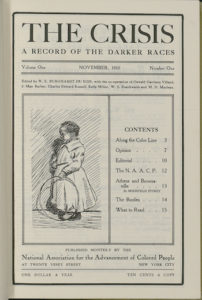
November 1910 copy
*On this date in 1910, The Crisis magazine was published. This is the official magazine of the National Association for the Advancement of Colored People (NAACP).
It was founded in 1910 by W. E. B. Du Bois (editor), Oswald Garrison Villard, J. Max Barber, Charles Edward Russell, Kelly Miller, William Stanley Braithwaite, and Mary Dunlop Maclean. The Crisis has been in continuous print since 1910, the oldest black-oriented magazine in the world. Today, The Crisis is "a quarterly journal of civil rights, history, politics, and culture. It seeks to educate and challenge its readers about issues plaguing African Americans and other communities of color." The magazine's original title was The CRISIS: A Record of The Darker Races. The magazine's name was inspired by James Russell Lowell's 1844 poem, The Present Crisis. The suggestion to name the magazine after the poem came from one of the NAACP co-founders, white activist Mary White Ovington.
The NAACP was recognized mainly as a grassroots foundation, relying on the surrounding community to sell subscriptions to The Crisis magazine. In its first year, the journal had a monthly circulation of 1,000. By 1918, it had more than 100,000 readers. It also grew from 20 pages and rising to as many as 68 pages, and in price, from 10 cents per issue and later increasing to 15 cents. The Crisis became incredibly influential during the 1910s and 1920s and greatly influenced the Harlem Renaissance literature movement.
In the 21st century, The Crisis primarily operates online via social media outlets on Facebook, Instagram, and its website. The Crisis website focuses on current injustices and shares articles from other news outlets. Although the mediums and topics of The Crisis have shifted since its beginning, it still produces articles that attempt to raise awareness of intersectional social justice issues. The Crisis now is largely dedicated to their statement of principles that lists: